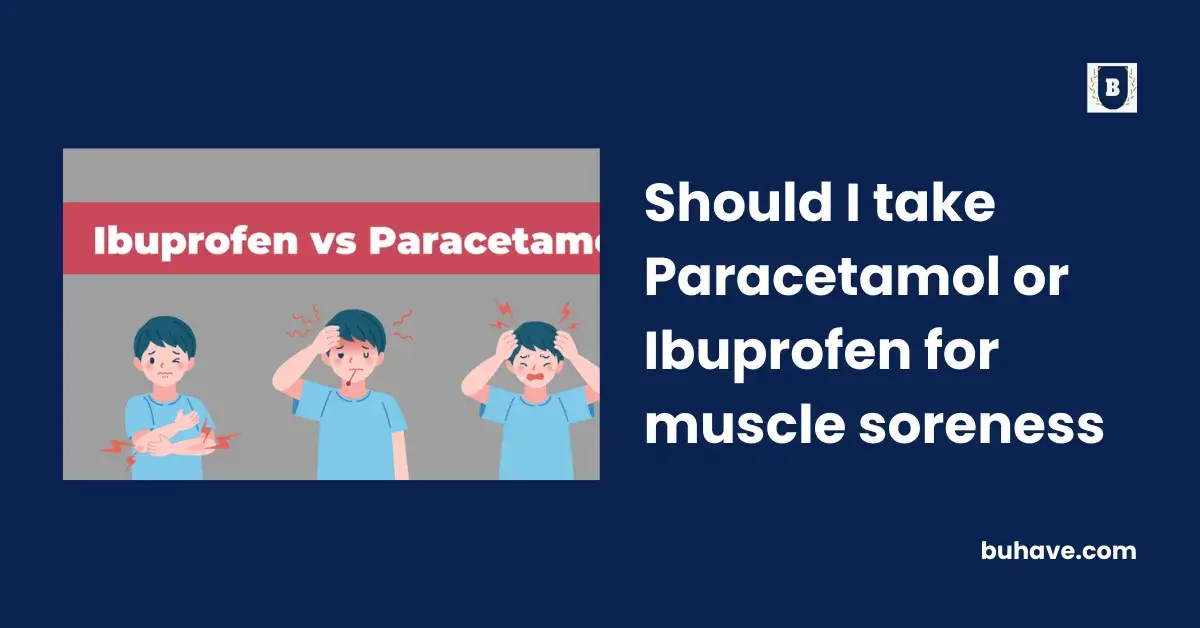Muscle soreness is a common issue experienced by people of all ages and backgrounds. It can occur after engaging in physical activities such as exercise, sports, or even from simple daily activities like lifting groceries or bending over to pick up something from the ground. Muscle soreness can be quite uncomfortable and interfere with one’s daily life. Luckily, there are medications available that can help alleviate muscle soreness, with paracetamol and ibuprofen being two of the most commonly used. In this blog post, we will discuss the differences between paracetamol and ibuprofen and help you determine which medication is best for muscle soreness.
What is Paracetamol?
Paracetamol is a commonly used over-the-counter medication that is widely available in many drug stores. It is an analgesic medication that is used to alleviate pain, including muscle soreness. Paracetamol works by blocking the production of certain chemicals in the brain that are responsible for causing pain and inflammation. As a result, paracetamol helps reduce pain, but it does not have any anti-inflammatory properties.
What is Ibuprofen?
Ibuprofen, like paracetamol, is an over-the-counter medication used to alleviate pain. However, unlike paracetamol, ibuprofen is classified as a nonsteroidal anti-inflammatory drug (NSAID). This means that ibuprofen not only helps reduce pain but also has anti-inflammatory properties that can help reduce inflammation and swelling.
Paracetamol vs. Ibuprofen: Which is Better for Muscle Soreness?
When it comes to deciding which medication to use for muscle soreness, the choice between paracetamol and ibuprofen depends on several factors, including the severity of the pain, the cause of the pain, and the individual’s medical history.
Other ways to help sore muscles
While medications such as paracetamol and ibuprofen can help alleviate muscle soreness, other methods can be just as effective. Here are some other ways to deal with sore muscles:
Rest and Recovery: Rest is crucial for the body to recover from muscle soreness. Avoid engaging in activities that may aggravate the soreness and instead, give your body time to heal.
Stretching: Gentle stretching exercises can help alleviate muscle soreness and prevent further muscle damage. Make sure to stretch all the muscles that are sore to help promote blood flow and speed up the recovery process.
Massage Therapy: Foam rolling has been used by many fitness enthusiasts to help with DOMS. Massage therapy can help reduce muscle soreness by increasing blood flow to the affected area, promoting relaxation, and reducing inflammation.
Hot and Cold Therapy: Applying heat or cold to the affected area can help reduce muscle soreness. Hot therapy can help promote blood flow and reduce stiffness, while cold therapy can help reduce inflammation and numb the pain.
Hydration and Nutrition: Proper hydration and nutrition can help support the recovery process by providing the body with the necessary nutrients and fluids it needs to repair damaged muscles.
Over-the-Counter Topical Creams: Topical creams and ointments containing menthol, camphor, or capsaicin can help alleviate muscle soreness by providing a cooling or warming sensation that can soothe the affected area.
Severity of the Pain
If you are experiencing mild muscle soreness, then paracetamol may be sufficient to relieve the pain. However, if the muscle soreness is more severe, then ibuprofen may be a better choice as it has stronger pain-relieving properties than paracetamol.
Cause of the Pain
If the muscle soreness is caused by inflammation, then ibuprofen may be a better choice as it has anti-inflammatory properties that can help reduce the inflammation and swelling. On the other hand, if the muscle soreness is not caused by inflammation, then paracetamol may be a better choice as it is better suited for relieving pain.
Medical History
Before taking any medication, it is important to consider your medical history. If you have any medical conditions such as liver or kidney disease, then paracetamol may be a safer choice as it does not have any anti-inflammatory properties that can potentially harm the liver or kidneys. Similarly, if you have a history of stomach ulcers, then ibuprofen may not be a suitable choice as it can increase the risk of stomach ulcers and bleeding.
Potential Side Effects of Paracetamol and Ibuprofen
Like all medications, both paracetamol and ibuprofen have potential side effects. The side effects of paracetamol are generally mild, but in rare cases, it can cause liver damage if taken in large amounts. The recommended maximum daily dose of paracetamol is 4g per day, and it is important not to exceed this limit.
Ibuprofen, on the other hand, can cause more significant side effects, especially if taken in large doses or over a long period. Some of the potential side effects
The Final Verdict
Whether you should take paracetamol or ibuprofen for muscle soreness depends on several factors, including the severity of the pain, the cause of the pain, and your medical history. Paracetamol is better suited for relieving mild pain, while ibuprofen is a better choice for more severe pain that is caused by inflammation. However, before taking any medication, it is important to consult with your healthcare provider and carefully consider your medical history to ensure that you are choosing a medication that is safe and effective for you. It is also important to follow the recommended dosage guidelines and to be aware of the potential side effects associated with both medications. Ultimately, the choice between paracetamol and ibuprofen should be made in consultation with your healthcare provider to ensure that you are making an informed decision that is best for your individual needs.
– If you are looking for guest posts write for us health now.

